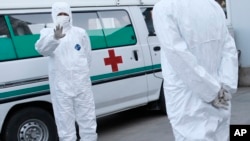North Korea’s decision to ban foreigners from participating in the upcoming Pyongyang marathon is the latest example of how its overly restrictive response to the threat of Ebola is stifling tourism and other business interests. Pyongyang’s sweeping travel restrictions are motivated by both public health and political concerns.
Even though there have been no reported cases of Ebola in Asia, North Korea closed its borders to foreign tourists last October to prevent the spread of the disease. It also imposed a strict 21-day quarantine for foreign aid workers and diplomats who enter the country.
Travel agencies now say that authorities are banning foreigners from participating in the upcoming Pyongyang marathon, one of its most popular tourist events. Last year was the first time foreign runners were allowed to participate.
Tour groups were planning to market the event in conjunction with arts festivals and cultural events surrounding the birthday of North Korea's founder, Kim Il Sung, on April 15.
But it is not just tourism that is being affected. Andray Abrahamian, the director of Choson Exchange, an organization that provides entrepreneurship and economic training to North Koreans, has lost thousands of dollars in grants and contracts because of the travel restrictions.
“They said to us if you can’t guarantee this program will run by the end of March we need to use it elsewhere. And unfortunately we haven’t been able to make that guarantee, so we have lost some funding,” said Abrahamian
Abrahamian said the government under Kim Jong Un has tried to encourage new business and investment ventures despite already strict controls and limited access to the Internet and other telecommunications. But the new travel restrictions are setting back these efforts.
“So the Ebola thing kind of illustrates the tension between some competing goals at the higher levels of decision-making,” said Abrahamian.
This is not the first time Pyongyang has tightened border controls to avoid disease outbreaks. North Korea closed it borders during the SARS epidemic in 2003, but that disease was prevalent in Asia, particularly in neighboring China.
Ahn Chan-il, a North Korean defector and president of the World Institute for North Korea Studies, said Pyongyang’s actions this time are in part an overreaction to a real health risk.
He said North Korean officials fear North Korea lacks resistance and measures to control Ebola when the disease flows into the country.
But he thinks the authoritarian regime is also exaggerating the Ebola threat for political advantage.
He said North Korea is utilizing the fright the disease inspires to create an atmosphere that allows for the Kim Jong Un regime to be more firmly established.
North Korean media have suggested Ebola was created by the U.S. military as a biological weapon.
The Kim Jong Un regime has been growing increasingly isolated due to the ongoing pressure from the U.N. over its human rights record and increased sanctions from Washington over its alleged involvement in the massive cyberattack on Sony Pictures in December.
VOA News Producer Youmi Kim contributed to this report.





